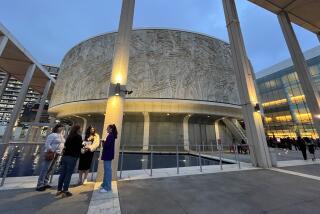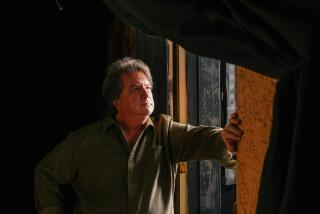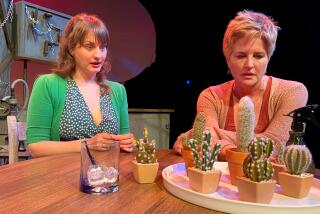Robert Falls, Midwesterner at heart, warms to L.A. for ‘Luna Gale’
“It’s currently 12 degrees in Chicago,” says Robert Falls, the artistic director of Chicago’s Goodman Theatre. He’s in L.A. to oversee the Tuesday opening at the Kirk Douglas Theatre of Rebecca Gilman’s “Luna Gale,” the world-premiere production he directed last year at the Goodman.
“That’s incredibly unusual,” he hastily adds. “As cold as Chicago gets, it never begins 10 days before Thanksgiving. They say global warming is a myth. Global freezing might be more accurate.”
But instead of basking in the L.A. sunshine, Falls is giving an interview in a dim rehearsal room in the Douglas. It’s the only available space: The lobby is crammed with shipping crates from Chicago, and the theater itself is hazy with sawdust. Electrical cords snake among the seats.
“Did you see Todd out there?” asks Falls, referring to set designer Todd Rosenthal, who has reconfigured the original “Luna Gale” set — it revolves on a turntable — to fit the smaller space. (The Douglas has 300 or so seats to the Goodman’s 900.) “Todd is about as tall as I am.” Falls is 6-foot-3.
“So we’re two of the towering forces in Chicago theater,” he says.
The joke works metaphorically as well as literally: Falls and Rosenthal are Tony winners.
Judging by Falls’ Twitter feed, this trip hasn’t been all business. (A recent tweet: “Thought I was here to do a play. Turns out it’s all about great food. LA restaurants are kickin’ ass.”)
But to talk to this Illinois native for an hour is to understand that although he may enjoy visiting the West Coast, his heart remains in Chicago, where he works and lives with his wife, Kat, a writer, and their three teenage children.
“I think Chicago is the best place in the country to create theater,” he declares. “I’m chauvinist about it. I think New York is a wonderful place to celebrate theater.” He has worked frequently in New York, on and off Broadway. “But there’s something about having a home in Chicago. It’s just a really extraordinary, unpretentious theater community that knows and supports each other in an absolutely unique way that you don’t find in any other city in the country.”
View of L.A.
He has run the Goodman for nearly 30 years. Under his leadership, the well-funded, Broadway-style nonprofit has become one of the most respected theaters in the country. In 1992 it received a special Tony Award for outstanding regional theater. In 2003, Time magazine named it the nation’s top regional theater, citing its focus on new work and its commitment to serving its local audience.
But Falls’ busy career hasn’t brought him to Los Angeles much; he last worked here two years ago, directing the premiere of Beth Henley’s “The Jacksonian” at the Geffen Playhouse. Several of his earlier productions stopped at the Ahmanson on their national tours (“Death of a Salesman,” starring Brian Dennehy, in 2000; Tim Rice and Elton John’s “Aida” in 2001).
Although he hasn’t spent enough time here to speak with authority, he suspects that L.A.’s theater scene is akin to Chicago’s. “I know it’s an extremely vital, complex community, with everything from very large theaters to very small theaters. There are probably 300 theaters in Chicago, but some of them seat 40 people, what we call storefront theaters. Chicago also has tremendous cultural diversity. There are extraordinary long-running African American, Latino and Asian theater companies.”
The adjective Falls uses most often is “extraordinary,” mostly in reference to other theater artists with whom he has had long collaborative relationships. One is Dennehy, with whom he has worked “almost countless times,” primarily on plays by Eugene O’Neill. They will work together again, with Nathan Lane, in January at the Brooklyn Academy of Music, remounting “The Iceman Cometh,” a Goodman production from 2012.
Another of Falls’ frequent collaborators is Gilman, a resident artist at the Goodman. Seven of her plays have been produced there (including “Boy Gets Girl,” “Spinning Into Butter,” “Blue Surge” and “Dollhouse”). “Luna Gale” is the fourth that Falls has directed.
“I think she’s one of our most important writers,” Falls says of Gilman. “She understands people very deeply, as a playwright must, but she writes very entertaining plays that have a moral core. She’s a bit in the tradition of very moral writers like Arthur Miller or Ibsen. Her plays have a social issue at their center, whether it’s racism, sexism or economic disparity, which doesn’t mean that they aren’t extremely entertaining, funny and illuminating.”
The plot of “Luna Gale” is hard to summarize — and maybe even off-putting, Falls says. “I don’t think people are absolutely dying to go out to see a play about meth-addicted parents who have to give up a child to the social service network. It doesn’t sound very exciting. But it’s actually a very complex, often very funny, sometimes harrowing play about complicated choices people make.”
The Center Theatre Group’s artistic director, Michael Ritchie, telephoned Falls last year, shortly after “Luna Gale” opened at the Goodman, to invite the production to the Douglas. “He had read the play, and he loved it,” Falls remembers. “We were thrilled. Any time you work on a new play, you’re hoping that it will enter the national repertoire of new work.”
Falls has spent his career simultaneously directing plays and theaters (before taking the helm at the Goodman in 1986, he was the artistic director of Chicago’s Wisdom Bridge Theater). He describes himself as a producer-director, a role that has allowed him to choose what to direct, a luxury sometimes denied freelance directors.
“They get pigeonholed, as directors of classics, or directors of new plays. I almost deliberately try to alternate between doing a classic play, by Shakespeare or Chekhov or Ibsen, and then doing a new play. I find that these things inform each other. When you do a classic, you sort of have to feel as if the playwright is sitting next to you. You want to get the sense that it’s a new play. And when you’re working on a new play, you want that play to become the classic of tomorrow. It’s a tremendous opportunity I’ve had, to bounce back and forth.”
The adjective most often seen in reviews of Falls’ versions of classics is “audacious.” Not only does he recontextualize them — a “Measure for Measure” set in a 1970s New York (“Times Square porno houses, corrupt and failing government,” is how he sets the scene); a “King Lear” set in the disintegrating former Yugoslavia; a revival of “Don Giovanni” set in 1920s Spain for Chicago’s Lyric Opera — but he tends to front-load the sex and violence.
New York Times critic Charles Isherwood called Falls’ Lear “aggressively raunchy” and “excruciatingly violent” but observed that it succeeded in its aim “to reawaken our revulsion at the violence in this relentlessly dark tragedy.”
“I truly adhere to the concept that Shakespeare is our contemporary,” says Falls with a shrug. “I just prefer to see him in modern dress and using modern imagery. I love the tension that exists between his language and poetry with a very contemporary world. This is pretty common practice, by the way. I practice it.”
Admiration for artists
In person, Falls does not come across as violent or audacious. Under his fluffy, snow-white hair and glasses, he wears an expression of kind tolerance, although he reacts a bit irritably when a scandal-hungry reporter asks if having a living playwright in the rehearsal room ever leads to tension.
“No, no, no, it’s fantastic,” he says, waving the question away. “There’s a real joy to having the writer next to you, an absolute joy. You probably get a million stories about a writer and director in conflict, but for me it’s always been a very healthy relationship.”
In fact, the quality of Falls that comes through most clearly is his admiration for artists who work with him. A director’s job, he believes, is to unlock the creative talent of actors and designers. He likes to spend a lot of time sitting around a table with his company, working on the text.
“And then, when you get on your feet,” he continues, “you’re just trying to help everyone create a rich, rollicking, complex, dangerous life. The thing about that is creating an atmosphere of safety. Actors are asked to go into dangerous places. Most of us spend our entire lives covering up how we really feel about virtually everything. Actors have to expose aspects of themselves that most people don’t. So I actually do believe that a lot of the directing process is connecting to a person and sort of understanding where they’re coming from psychologically.”
Although this process sounds somewhat mystical, it comes naturally to Falls. “I’ve never not directed,” he says when asked what drew him to his career. “As a child, I did it. I organized puppet shows and ventriloquism acts and put on plays on people’s porches. I’m just one of those people who never stopped doing what I was doing when I was 6 years old.”
Nor does he worry about the future of the theater: “Theater is the place where we come to confront humanity. It’s essential to the soul,” he says. “It always has been, and I think it always will be.”
A reporter’s attempts to locate dissent in the ranks met with failure. Mary Beth Fisher, the highly regarded Chicago actress who plays a conflicted social worker in “Luna Gale,” wrote in an email: “I’m never more relaxed onstage than when I’m working with Bob. It is no easy task to take a group of actors who bring different techniques and training into the rehearsal room and guide them into becoming an ensemble, working as one to create a rich and believable world in which the audience can lose themselves. In that, he is a master.”
Gilman, also via email, concurred: “I love the atmosphere Bob creates in the rehearsal room. He loves talent and questions and ideas, so everybody feels inspired to do their very best work. He doesn’t control so much as guide (or at least he makes it look that way!).”
Pressed for challenges she’s experienced working with Falls, Gilman finally offered, “He’s very tall! When I have my picture taken with him, it’s the only time I feel short.”
More to Read
The biggest entertainment stories
Get our big stories about Hollywood, film, television, music, arts, culture and more right in your inbox as soon as they publish.
You may occasionally receive promotional content from the Los Angeles Times.






